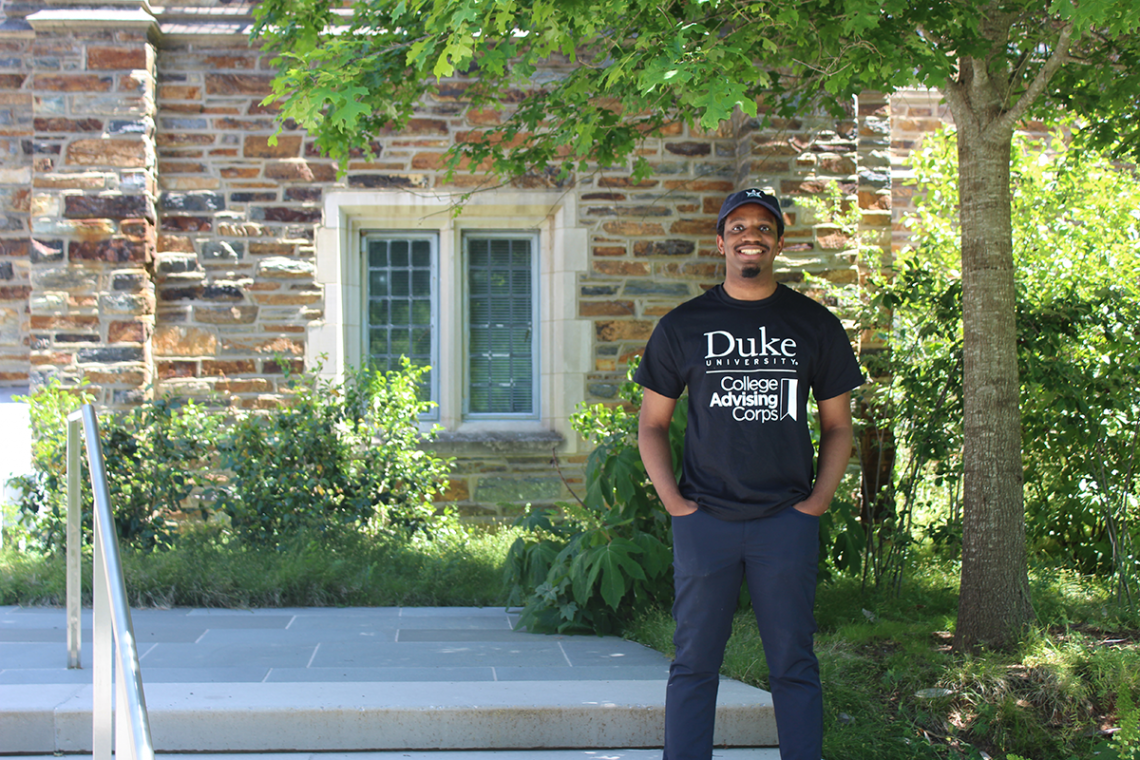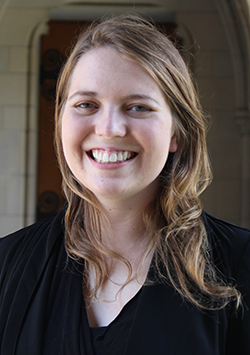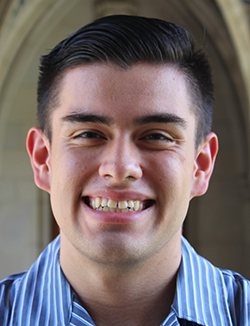Bringing It Home, Duke Alumni Take College Advising to the Heart of North Carolina

Growing up in Ahoskie, Desmond Gatling, T’19, never thought he’d get into a college like Duke. Despite doing well in all his classes, his standardized test scores were below the admissions average and none of his peers were applying to selective institutions. However, with the help of a College Advising Corps adviser, he was able to put together a competitive application.
“She helped me find teacher recommendations and really also just gave me confidence to believe college was an option for me,” Gatling said.
Now, after graduating in 2019, Gatling is paying it forward as a Duke College Advising Corps (CAC) member at Lakewood High School in Sampson County, N.C. A program of Duke’s Office of Durham and Community Affairs’ education and workforce development unit, Duke CAC works to increase the number of low-income, first generation high school students from under-resourced high schools across the state who enter and complete higher education.
Recent Duke graduates serve as “near-peer” advisers, helping high school students navigate the college admissions process, from helping them fill out a Free Application for Federal Student Aid (FAFSA) form, to setting up campus visits.
Ten of the 16 schools where advisers work are in rural counties such as Sampson, which present a particular set of challenges. The cost of applying and attending college can be a big deterrent for rural students, who may not be aware of application fee waivers, financial aid packages or scholarship programs. Many students and their parents are therefore more skeptical that a college degree will pay off. Moreover, rural high schools have less resources, offering fewer advance placement classes and extracurricular opportunities, which leaves students feeling less prepared for college.
“The biggest disparity I felt as a person going through education in a rural community was a lack of information. And that’s why I was drawn to advising and school counseling,” said Gatling.
Gatling wants to make sure his students are aware of their options and pushes them to apply for scholarship and summer programs to expose them to what college could offer. The majority of graduates from Lakewood High School attend community college or start working; very few attend four-year colleges. Gatling is hoping to get all seniors to at least submit an application and a financial aid form to start fostering a college-going culture.
Example for Young North Carolinians
Five of the sixteen advisers are native North Carolinians who graduated from public high schools in Beaufort, Chatham, Hertford, Orange and Union counties. In addition to Gatling, Savannah Bunn, T’19, and Siera Lunn, T’19, are also serving in Sampson County while Frances Beroset, T’19, is in Lee County and Jose Ortega, T’19, is in Orange County. North Carolina sends the most students to Duke every year and there are close to 20,000 Duke alumni living and working across the state.
Stelfanie Williams, T’98, has seen the influence of Duke alums in creating educational opportunity across the state. As president emerita of Vance-Granville Community College, a myFutureNC Commissioner, and now as Duke’s vice president for Durham affairs and community, she sees the multiplier effect generated by Duke alums from North Carolina making a commitment to remain in the state after graduation.
“Duke college advisers who serve for one, two or even three years bring both their lived experience and the power of example to inspire high school students of all backgrounds to plan for the future,” she said.
Rural Challenges
 Savannah Bunn, T’19, grew up in Bath, where her parents were teachers at the local high school. Her parents and older brother helped her apply to Duke, but she recognizes many classmates did not have that support.
Savannah Bunn, T’19, grew up in Bath, where her parents were teachers at the local high school. Her parents and older brother helped her apply to Duke, but she recognizes many classmates did not have that support.
“I saw where there was a lot of potential in my fellow classmates who were just not going anywhere because there wasn’t someone in that role,” said Bunn, who is serving at Midway High School in Sampson County.
Guidance counselors in rural schools typically have an overwhelming caseload. In North Carolina, the counselor to student ratio is 1 to 378. In addition to college prep, guidance counselors are responsible for helping students manage their schedule and cope with socio-emotional challenges. Having someone dedicated to the college application process can lessen the burden on the rest of the team.
Bunn is able to spend a lot of time with students in individual coaching sessions and at school events. Some students reveal they are facing challenging circumstances – they may be homeless or undocumented - which can complicate applying to college. Bunn helps students get answers, frequently calling admissions offices herself, so they can fill out the forms.
“I’ve learned over and over again how difficult this process is. The people who make things like FAFSA think they are straightforward but life isn’t straightforward,” said Bunn.
Supporting First-Generation Students
 Being able to relate to what high school students are experiencing helps advisers build trust. For many first-generation students, the application process can feel so daunting they may hesitate to even ask for help. Jose Ortega remembers feeling that way when he was in high school. Neither of his parents had gone to college so they couldn’t help him, and he was too shy and overwhelmed to talk to his guidance counselor. He turned to his friends instead who encouraged him to sign up for Advanced Placement (AP) classes and apply to Duke.
Being able to relate to what high school students are experiencing helps advisers build trust. For many first-generation students, the application process can feel so daunting they may hesitate to even ask for help. Jose Ortega remembers feeling that way when he was in high school. Neither of his parents had gone to college so they couldn’t help him, and he was too shy and overwhelmed to talk to his guidance counselor. He turned to his friends instead who encouraged him to sign up for Advanced Placement (AP) classes and apply to Duke.
Five years later, Ortega is back at his high school in Orange County working alongside his former teachers and counselors as a college adviser. Ortega admits that it can feel strange to be back at his old high school, but he knows it gives him credibility with students.
“I can tell them ‘I was exactly in your shoes five years ago,’ so I feel like they’re more willing to share their personal information and vulnerabilities,” said Ortega.